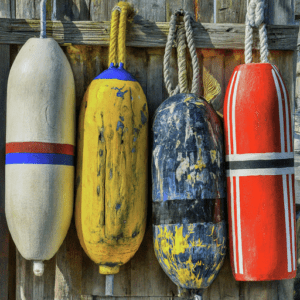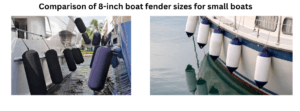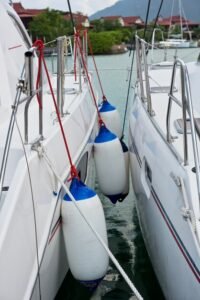If you’re a boat owner or spend time out on the water, you’ve probably come across boat fenders. They’re those chunky, cushiony things that protect your boat from slamming into the dock or another boat.
But here’s the question that might cross your mind: do boat fenders float? It’s not just about avoiding damage to your boat—it’s also about convenience and safety. Let’s dive into the details and get the answers you need.
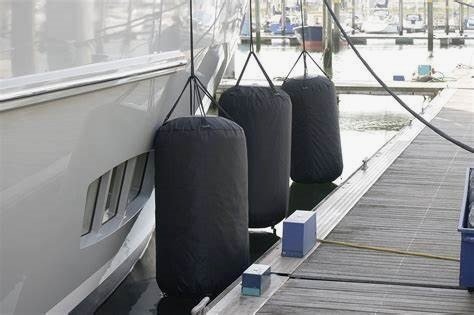
1. What Are Boat Fenders? A Quick Look at the Different Types
Boat fenders are your boat’s best defense against bumps and scrapes. Think of them as protective cushions that keep your boat safe from docks, pilings, or other boats. Their job? Simple but crucial—absorb impact and prevent damage to your boat’s hull.
Fenders come in different shapes and sizes, but they all serve the same purpose—protecting your boat. Here’s how they work:
- When you’re pulling into a dock or tying up next to another boat, you attach the fenders to the sides of your boat using ropes or straps.
- The fender creates a buffer between your boat and any hard surfaces, so when the wind or waves push your boat, it’s the fender that takes the hit, not your boat’s paint or fiberglass.
Now, there are a few different types of fenders to choose from, depending on your needs and the size of your boat. The most common ones are inflatable fenders and foam-filled fenders, but you might also come across rubber or hybrid fenders.
Want to dive deeper into more boating essentials? Check out our detailed guide on Choosing the Right Boat Equipment for Safe Docking. It’s packed with tips that’ll help you ensure a safe and hassle-free experience on the water.
Do Some Boat Fenders Float and Others Don’t?
Most boat fenders are designed to float—whether they’re inflatable or foam-filled. If a fender falls overboard, you want to be able to retrieve it easily, right? Let’s take a closer look at how different types of fenders stay afloat and why some might sink.
Inflatable Boat Fenders
Inflatable fenders are filled with air, which naturally makes them buoyant. As long as they’re fully inflated and free from leaks, these fenders will float with ease. They’re lightweight and popular because they’re easy to store when deflated. However, a deflated or punctured inflatable fender can lose its buoyancy and may sink if not properly maintained. Regularly checking for leaks and keeping them inflated is key to making sure they stay afloat.
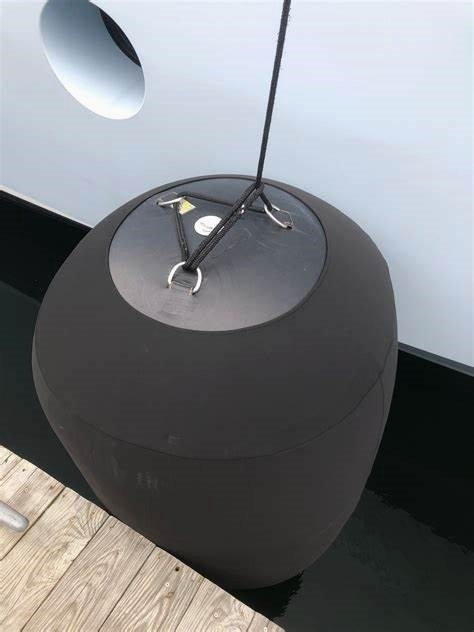
Foam-Filled Boat Fenders
Foam-filled fenders are packed with dense, closed-cell foam that provides natural buoyancy. Even if the outer shell gets damaged, these fenders will still float because the foam doesn’t absorb water. They’re generally more durable than inflatable fenders, but they’re bulkier and harder to store. The extra durability means you won’t need to worry about deflation over time, making them a reliable option for long-term use.
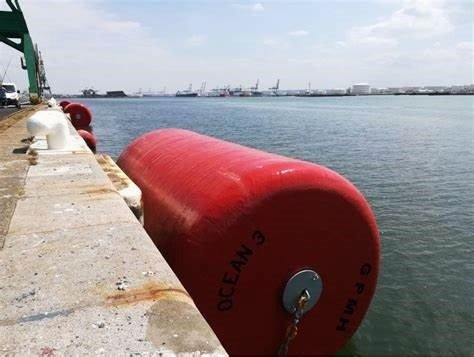
Rubber or Non-Floating Fenders
Not all fenders are designed to float. Some, especially those made from heavier rubber or solid materials, can sink if they fall into the water. These fenders are more common in commercial or industrial settings where toughness matters more than buoyancy. While these fenders are durable and built to handle heavy impacts, they’re not ideal if you need a fender that floats for easy retrieval.
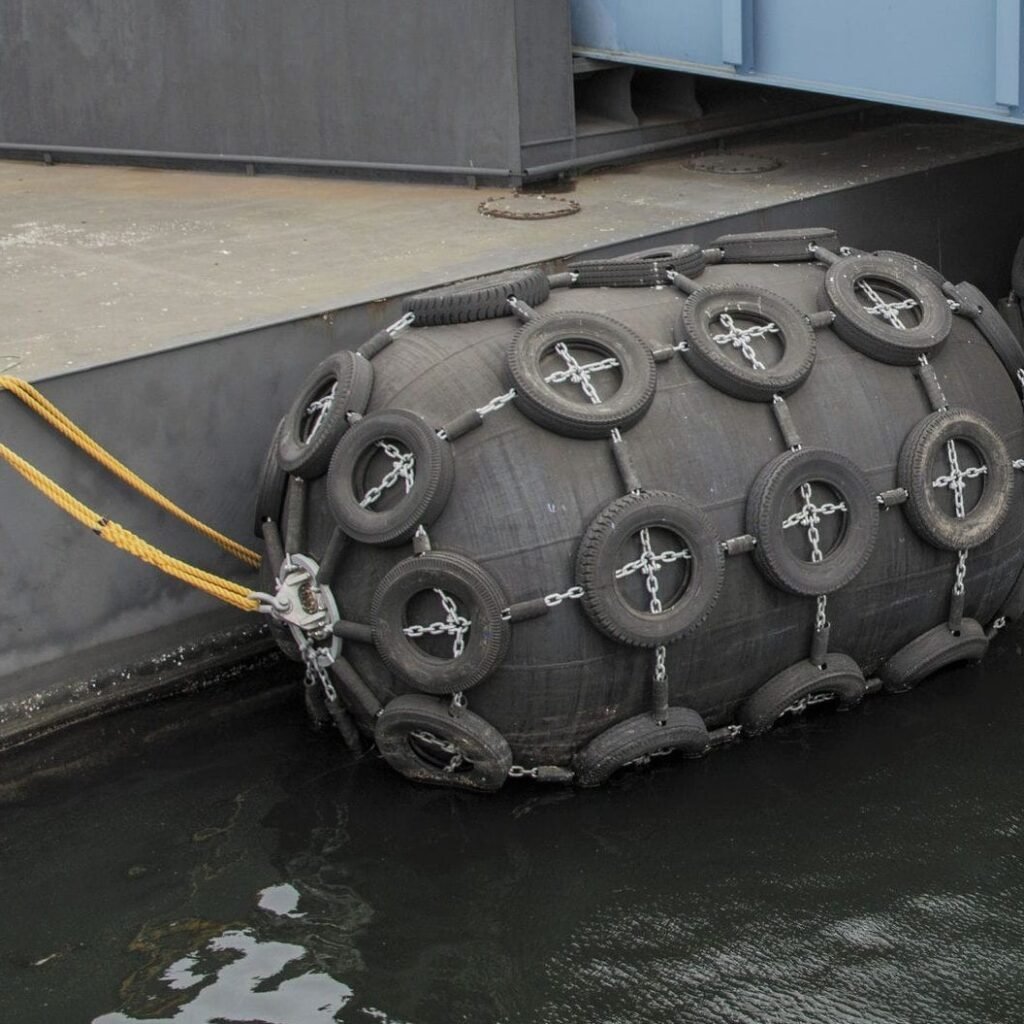
Factors That Affect Whether a Fender Will Float
While most boat fenders are designed to float, several factors can influence how well they stay afloat. Understanding these factors can help ensure your fenders perform their best when needed. Let’s break down the key elements that impact a fender’s buoyancy.
Material Composition
The material a fender is made of plays a significant role in its ability to float. Most fenders are made from inflatable plastic or vinyl or are foam-filled, both of which are specifically chosen for their buoyant properties.
- Inflatable Fenders: These fenders are typically made from durable plastic or vinyl. The air inside gives them their buoyancy. As long as the material stays intact and doesn’t get punctured, inflatable fenders will float with ease. They’re lightweight, easy to handle, and convenient to store when deflated.
- Foam-Filled Fenders: Filled with closed-cell foam, these fenders are naturally buoyant. Even if the outer material gets damaged, the foam keeps the fender afloat. Foam-filled fenders are built for durability and long-term use, so you won’t have to worry about them sinking. However, some fenders made from heavier materials, like rubber, might not float, as these are typically used in commercial settings where buoyancy isn’t required.
Air and Buoyancy
For inflatable fenders, the amount of air inside is crucial to their ability to float. If they’re not properly inflated, they may lose their buoyancy and sink.
- Full Inflation: When fully inflated, the fender floats easily. The air inside creates buoyancy, keeping it on the water’s surface. However, if the fender isn’t fully inflated, or if it deflates, it won’t stay afloat.
- Leaks and Punctures: A small hole or tear can slowly cause air to escape, which reduces the fender’s ability to float over time. Regularly checking for damage and keeping your fenders properly inflated is essential to ensure they stay buoyant.
Size and Shape
The size and shape of a fender also affect its floatation. Larger fenders typically have more buoyancy because they displace more water, allowing them to support more weight before sinking.
- Larger Fenders: These can handle more impact and generally float better, even in rougher conditions. They’re ideal for bigger boats or areas where docking can be tricky.
- Smaller Fenders: While easier to handle, smaller fenders have less buoyancy and may not float as well under heavy loads or in strong currents.
By considering these factors—material, air pressure, size, and shape—you can ensure your fenders remain afloat and provide the protection your boat needs.
Can Boat Fenders Float in Both Freshwater and Saltwater?
Another common question is whether boat fenders float the same way in freshwater and saltwater. The short answer is: yes, boat fenders float in both, but there are some differences you should be aware of.
Why Do Fenders Float Better in Saltwater?
The main difference between freshwater and saltwater is density. Saltwater is denser due to its salt content, which gives objects, like boat fenders, more buoyancy.
- In Saltwater: Fenders float higher because the water’s density allows them to displace less water to stay afloat. This means your fenders will float more easily, even if they aren’t fully inflated.
- In Freshwater: Fenders still float well but may sit a little lower in the water since freshwater is less dense. This difference is minor, though, and usually won’t impact performance unless the fender is very large or heavy.
What Does This Mean for You? If you boat in saltwater often, your fenders will float more easily, even with some wear or deflation. In freshwater, ensure your fenders are well-inflated and maintained to avoid any sinking issues. In both cases, regularly checking your fenders’ condition is key to ensuring they stay afloat and protect your boat properly.
How to Choose the Best Floating Boat Fenders for Your Needs
Picking the right boat fender isn’t complicated, but there are a few things you should think about before making a purchase. Choosing the best fender will depend on factors like your boat’s size, the waters you boat in (freshwater or saltwater), and how much maintenance you’re willing to do.
Consider Your Boat’s Size
First things first: the size of your boat will largely determine the size and type of fenders you need. Here’s a quick guide:
- Small Boats (up to 25 feet): You’ll want to use smaller fenders that are easy to handle. Inflatable boat fenders are a great choice for these boats because they’re lightweight and can be deflated when not in use. Just make sure they’re fully inflated to stay afloat.
- Mid-Size Boats (25 to 40 feet): For boats in this range, you’ll need medium-sized fenders that offer more protection. Foam-filled fenders are a durable option because they provide excellent protection and maintain their buoyancy over time.
- Large Boats (40 feet and up): Larger boats require larger fenders. You may need fenders that are thicker and longer to handle the increased weight and impact. For these boats, consider using multiple fenders along the side to ensure full coverage.
How to Test if Your Boat Fender Still Floats
Now that you’ve chosen the best fender for your boat, you’ll want to make sure it actually floats—especially if you’ve been using it for a while. Here’s how to test the buoyancy of your fenders before you head out on the water.
Step 1: Check for Damage
Start by inspecting the fender for visible issues:
- Cracks or Tears: For inflatable fenders, any crack or tear can cause air leaks, reducing floatability.
- Surface Damage: Even small punctures can lead to deflation over time.
- Discoloration or Aging: Foam-filled fenders can wear out from sun exposure, which may reduce their effectiveness.
Step 2: Inflate the Fender (If Inflatable)
If you’re using inflatable fenders, ensure they’re fully inflated.
- Use a Pressure Gauge: Check the air pressure to match manufacturer recommendations.
- Squeeze Test: A quick squeeze can tell if the fender is soft or deflated. Top it up if needed.
Step 3: Test in the Water
Now, drop the fender in the water and watch:
- Floating Position: A properly working fender will float near the surface.
- Buoyancy: If it sits too low or wobbles, there could be hidden damage or air loss.
Step 4: Look for Slow Deflation
Monitor inflatable fenders for a while. If they gradually lose buoyancy, you might have a slow leak that needs fixing.
Step 5: Foam-Filled Fender Test
For foam-filled fenders, simply drop it in. If it floats, it’s fine. If it starts to sink, the foam may be waterlogged, and it’s time for a replacement.
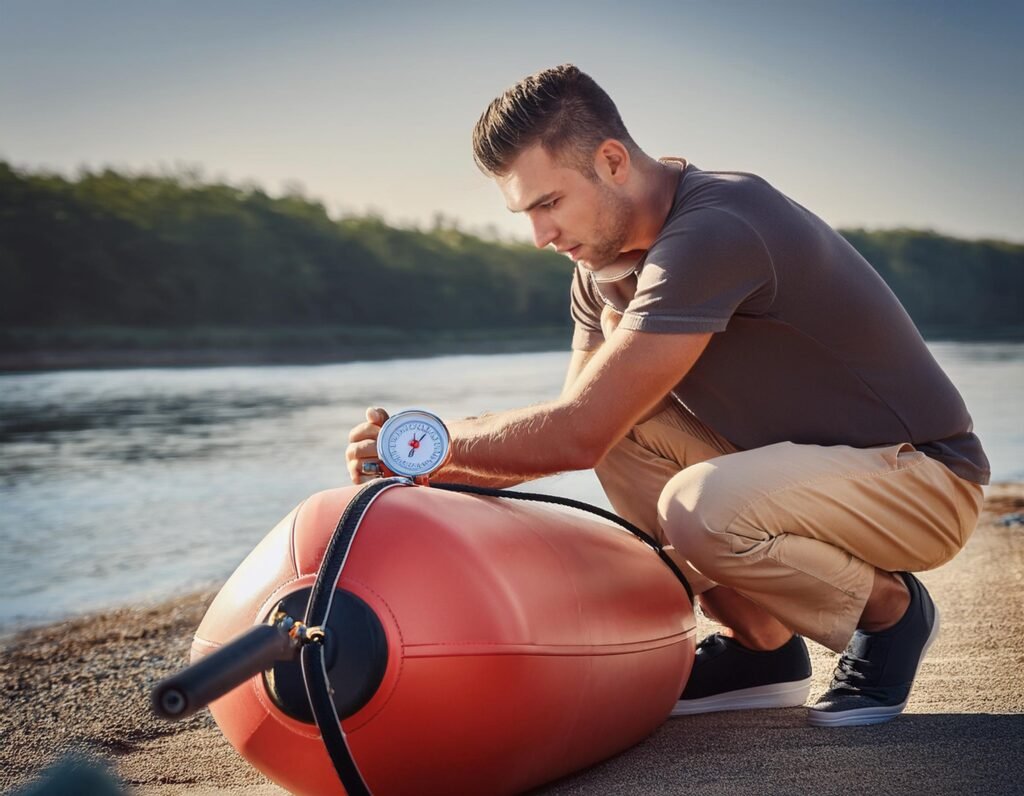
Conclusion
Yes, boat fenders float, but it depends on the type and condition. Inflatable fenders need proper inflation, while foam-filled fenders float naturally. However, damaged or heavier rubber fenders may sink.
To ensure your fenders float, regularly check for leaks, maintain inflation, and test their buoyancy. Well-maintained fenders keep your boat protected, whether in freshwater or saltwater.
FAQs About Boat Fenders Floating
1. Do all boat fenders float?
Most boat fenders, especially inflatable and foam-filled ones, are designed to float. However, heavier rubber or damaged fenders may not stay afloat.
2. Can inflatable boat fenders sink?
Yes, if an inflatable fender loses air due to a puncture or improper inflation, it can sink.
3. Do foam-filled fenders always float?
Yes, foam-filled fenders are naturally buoyant and will float even if the outer layer is damaged.
4. How often should I check my fenders for leaks?
It’s a good idea to inspect your inflatable fenders for leaks before every use and ensure they’re fully inflated.
5. Do boat fenders float better in saltwater?
Yes, fenders float better in saltwater due to its higher density, but they’ll still float well in freshwater.
6. How do I test if my fender will still float?
Simply drop the fender in water and observe. It should stay near the surface. If it sits too low or sinks, it may need repair or replacement.

